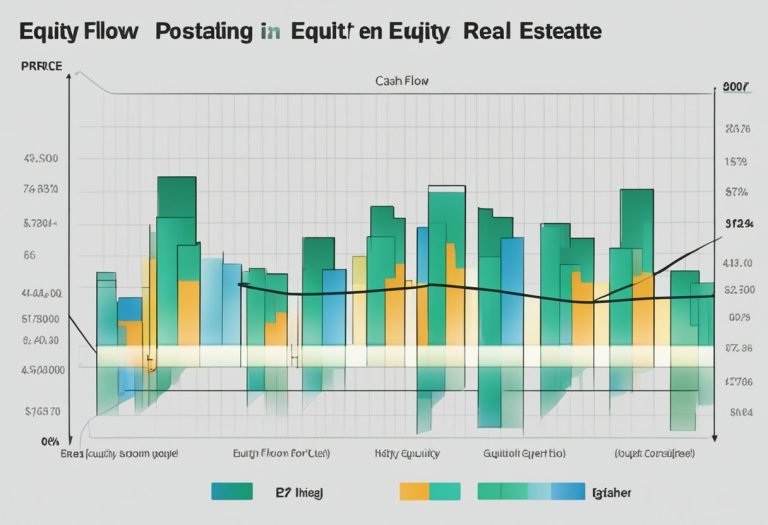Navigating the Stages of Real Estate Cycle: 5 Indicators for Successful Investing
Understanding the Stages of Real Estate Cycle
You might not realize it, but your financial freedom could hinge on understanding the stages of real estate cycles. In this article, our focus is on exploring ways of optimizing real estate investment opportunities for maximum cash flow and upside in 2024.
We’ll unlock the secrets of market patterns, equipping you with the knowledge to navigate the ups and downs of property investments.
You’ll learn to decode signals like employment rates, interest rates, GDP growth, and more, all of which can profoundly influence the performance of your portfolio when investing in real estate.
With this guide, you’re not just investing; you’re crafting a strategy that adapts to economic tides, government policies, and understanding the right time to buy, ensuring you’re always a step ahead.
It’s about making informed choices that align with your aspirations for independence and stability. Dive in and let this be the compass that guides your investment journey to uncharted territories of opportunity.
Market Prediction for Optimizing Real Estate Investments
To adeptly navigate through the ebb and flow of the real estate market, you’ll need to grasp how economic indicators can signal upcoming trends and cycles, particularly in the residential and commercial real estate sectors.
Understanding real estate market indicators is your compass for freedom in investment decisions and is a hallmark of good real estate asset management.
By studying historical data, you can anticipate market movements and make informed choices that align with your pursuit of financial independence.
In the real estate market, timing is everything. Estate Market Cycles: Timing your entry and exit during the four phases of the real estate market is crucial for capitalizing on growth and cushioning against downturns and buying at the right price.
Look for expansion phases when prices are rising, which often coincide with decreasing unemployment rates and increasing consumer confidence.
Job growth and new construction indicators suggest a thriving economy where more people can afford to buy or rent homes, driving up demand, prices, and potentially, your rental income.
By understanding how the real estate market operates, you’re equipped to strategize for long-term success. You aren’t just buying property; you’re investing in a cycle of opportunities that can expand your portfolio and your freedom, whether it’s to acquire more properties or to liquidate for cash in 2024.

Don’t just watch the market—master it. Understand the four phases of the real estate market, including the recession phase. Study the signs, predict the shifts, and ride the wave to financial autonomy.
Refining Investment Strategy for Every Phase
Refining your investment strategy in 2024 requires understanding key economic indicators such as job growth and new construction statistics that signal the health and direction of the real estate market during its four steps.
By diving into market cycles, government policies, and new construction trends, you’re empowering yourself to make moves that sync with the natural ebb and flow of the industry and maximize investment opportunities.
A solid understanding of local market nuances ensures you’re not caught off guard when the real estate market experiences its inevitable shifts, like changes in job growth or a surge in new construction.
Timing your Real Estate investments with market cycles can be a highly rewarding venture. It’s about recognizing when to dive in and when to hold back, playing the long game to your advantage.
To help mitigate risks associated with market fluctuations, diversify your real estate portfolio across different property types and locations. This strategy not only spreads your risk but also potentially maximizes your chances of discovering more investment opportunities and increases your rental income. Also look to take advantage of real estate tax deductions when investing in real estate.
Real Estate Market Cycles are like waves; ride them with savvy, and you’ll capitalize on growth spurts and recovery phases.
Don’t just follow the herd—anticipate where the next opportunity lies by staying informed and connected, especially during the four phases of the real estate market. With patience and a clear vision, your real estate journey can be a testament to freedom, financial growth, and the art of smart investing.

Analyzing Economic Trends
Understanding the intricacies of economic trends, you’ll discern the optimal moments to adjust your real estate investments, whether in the residential or commercial real estate, for maximum profitability.
As you navigate through the twists and turns of real estate cycles, it’s crucial to recognize when economic indicators start signaling a shift, particularly during the recession phase of the four intervals of the real estate market.
The market operates in cycles, and an expansion phase can’t last forever, indicating the time to buy or liquidate investment opportunities can’t remain constant. By keeping a keen eye on unemployment rates, job growth, and increasing consumer spending, you can gauge the health of the economy and its impact on demand for properties and rental income potential.
When local market conditions suggest that property values decrease, it may be a sign that the market is cooling off. This is the time to be vigilant and ready, as prices bottom out and investors identify promising opportunities.
As the cycle progresses and demand for properties rises, that’s your cue to consider the timing of your investment moves.

Real estate isn’t just about location—it’s also about timing. By analyzing historical data alongside current economic trends, you can craft a strategy that aligns with your desire for freedom and financial success.
Remember, the best investment decisions are informed by a thorough understanding of how the market breathes and moves—anticipate, act, and prosper.
Implementing Risk Management
Why haven’t you implemented a risk management plan for your real estate investments yet? Understanding the risks and potential rental income associated with the market is crucial for navigating the unpredictable nature of real estate.
A well-devised plan can help you anticipate market changes, allowing you to strategically time your purchases and sales to maximize gains and minimize losses.
Each market cycle phase presents challenges that can impact your portfolio. For instance, during a market downturn when prices are declining due to government policies, properties might go into foreclosure, presenting an opportunity to acquire properties for savvy investors.
However, this period requires a strategic approach. Investors need to exercise caution during this phase, as it’s easy to overextend financially with the allure of lower prices.
By analyzing demographic trends in 2023 and government policies, you can predict shifts in housing demands, influencing where and what types of properties to invest in or acquire.
Maintaining cash reserves is essential for weathering periods of unexpected vacancies or maintenance issues that are more prevalent during downturns.

Assessing Property Valuation
In assessing property valuation, you’ll need to consider key economic indicators that reflect the property’s current and potential value.
Recognize that property types and locations, whether commercial or residential real estate, significantly influence these values.
During the expansion phase of the four stages of the real estate cycle, typically identified by an upswing in the market, you’re likely to see increased property values and investment opportunities in the housing market.
This is your cue in 2023 to analyze the timing of acquiring properties and the best time to buy for your investments, as it can be crucial for maximizing returns.
During downturns or the recession phase of the housing market, when prices are lower, some may lament declining property values, but as a savvy investor in real estate, you might actually find golden opportunities.
Savvy investors who entered the market during these times often reap the rewards when the tide turns.
If you’re aiming for freedom in your financial pursuits, remember that real estate as well can offer this liberty – if you play your cards right.

To ensure you’re making informed decisions, stay abreast of market trends and consider distressed properties, especially during the recession phase, that could lead to long-term gains in the stage of the real estate market.
Optimize your strategies to not just ride out the four stages of the real estate market, but to thrive in them.
Frequently Asked Questions
What Is the 5 Rule in Real Estate Investing?
You’ll find the 5 rule in real estate investing emphasizes buying properties 5% below market value and selling 5% above, optimizing cash flow, appreciation potential, and leveraging risks for greater capital allocation and diversification benefits.
What Are the Real Estate Economic Cycles?
You’ll navigate real estate cycles by analyzing market trends, demand, supply dynamics, interest rates, and policies.
Gentrification, urbanization, and infrastructure shape opportunities, guiding you toward freedom through smart investment decisions.
What Are Real Estate Investment Strategies?
You’re a real estate maestro, effortlessly flipping properties and managing rentals.
Dive into commercial investing, join REITs, and explore vacation havens.
Wholesaling, land deals, crowdfunding, lease options, and equity sharing are your keys to freedom when investing in real estate.
Which Phase of the Real Estate Cycle Would Be the Optimal Time to Build?
You should build when market timing aligns with low construction costs, available land, favorable zoning, and optimal interest rates.
Developer sentiment, supply-demand balance, labor market, and economic forecasting all signal this phase is ripe for you.
Conclusion
You’ve sailed the vast ocean of real estate, navigating through stormy markets and basking in the glow of prosperity.
With the compass of economic indicators in hand, you’ve honed your investment strategy to an art form.
Remember, the winds of economic trends can fill your sails or capsize your plans, so keep a vigilant eye on risk management.
Your property valuations are the lighthouse guiding you home—towards the shores of unparalleled investment success.








One Comment
Comments are closed.